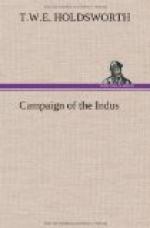It will be seen by his letters, and it is confirmed by the official despatches of the Commander-in-chief, that the company to which he was attached (the light company of the Queen’s) led the storming party at Ghuzni. He was shot through the arm and through the body, and left for dead at the foot of the citadel at Kelat, whilst endeavouring to save the lives of some Beloochees who were crying for mercy. And for these services he is to be rewarded with a medal, by Shah Shooja; for Ghuzni, and for the capture of both places he has the full enjoyment of the highest gratification that a soldier can feel—the consciousness that he has done his duty to his country, and, let me hope, in the act of mercy in which he suffered, his duty to his God as a Christian. But he is not a solitary example of such good fortune. No one who was wounded and survived may have been nearer death than himself, yet are there others who have done more, and suffered more, as the history of the army of the Indus would bear ample testimony.
Let me then ask, in behalf of the British officer, when he is lightly spoken of as a man, or when the expenses of the army are cavilled at, on which side is the debt—on his, or on that of his country?
A.H. Holdsworth.
Brookhill,—May, 1840.
[Illustration] It may be right to draw the attention of the reader to a circumstance which, at first sight, may appear singular—that the same letters frequently contain reports quite contradictory to each other. It should therefore be borne in mind that such letters were probably written at different times, as the writer found opportunity; who, being anxious that his family should know all that passed as well in the camp as in the field, preferred leaving each report in the way in which it was circulated at the time of his writing it, rather than correct it afterwards, as the truth, might turn out. Such letters shew the situation in which an army is placed on its landing in a new country, where no account of the movements of the inhabitants can be relied upon, and the heavy responsibility which attaches to the officers who are entrusted with its command.




